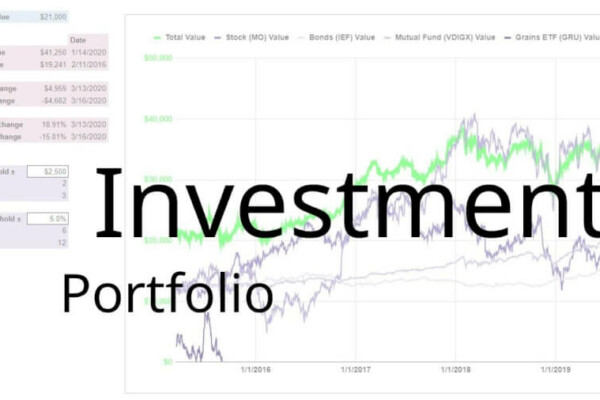In our fast-paced world, personal investment can go a long way in helping you achieve financial security. It is crucial to look into private investments to build wealth. Personal investments help avoid financial hurdles. This list of examples may help you decide what type of personal investments are best for you.
Each personal investment will state:
- What the personal investment is
- Who invests in it
- Why this personal investment is appealing
- How long the personal investment will tie up your money
- Where you can invest in it
- How the personal investment works
1) Bank accounts
Bank accounts are deposits held with FDIC-insured institutions. Anybody who can provide the appropriate documentation can open a bank account. Bank accounts can be opened at brick and mortar banks or with online banks. Most bank accounts don’t have a maturity date (with the exception of CDs) and can be held indefinitely. People typically open bank accounts for the purpose of having liquid cash available to pay for expenses.
Bank accounts include the following:
- Checking accounts
- Saving accounts
- CDs
- Money market accounts
2) Treasury securities
Treasury securities represent money borrowed by the government. Anyone, including individuals, banks, investment funds, other government agencies, and other countries, can purchase Treasury securities. Treasury securities can be purchased through a bank or treasurydirect.gov. Investors can also purchase them through mutual funds or ETFs. Treasury securities are auctioned at various times throughout the year. They can be purchased at any time on the secondary market.
The U.S. government has a solid track record of paying back its debt. That is why Treasuries are seen as low-risk investments and rarely result in a loss of principal.
There are four major categories of Treasuries:
- Treasury Bills
- Treasury Notes
- Treasury Bonds
- Treasury Inflation-Protected Securities (TIPS)
3) Life insurance/annuities
Life insurance is purchased by individuals who want to ensure that they or their loved ones will receive benefits or compensation should the policyholder die prematurely. Those who have life insurance are asked to pay a recurring fee (premium) to the institution that grants them coverage. Life insurance can be purchased at any time but is typically purchased when a person is younger and premiums will be cheaper. Life insurance can be purchased directly through an insurance company or, sometimes a third party, like an employer, agent, or broker. A simple online search will provide you with a multitude of ways to purchase life insurance.
There are several types of life insurance. Not all types are would be considered personal investments in the traditional sense (e.g. term).
- Term life insurance
- Whole life insurance
- Universal life insurance
- Final expense insurance
- Group life insurance
On the other hand, annuities deliver a steady source of income for (typically retired) individuals. They start by accumulating funds, where the investor begins paying at specific intervals. Investors may also choose to pay in bulk. When the accumulation finishes, the annuities start to pay off. Contact an insurance company if you are interested in purchasing an annuity. Annuities are appealing for several reasons, but primarily because they offer guaranteed income for life.
There are four types of annuities, namely:
- Fixed annuities
- Variable annuities
- Immediate payment annuities
- Deferred income annuities
4) Bonds
Like Treasury securities, bonds are means for borrowing money. As mentioned above, bonds can be issued by federal governments. But also local/state governments and businesses as needed. Bonds can be purchased through a brokerage. They can be purchased individually or via a mutual fund or ETF. Bonds are considered safer investments than equities. They also provide steady income and, in some cases, tax benefits.
Aside from Treasury bonds, there are other types of bonds:
- Municipal bonds
- Corporate bonds
- Foreign bonds
- Mortgage-backed bonds
5) Mutual funds/ETFs
Mutual funds combine money from many investors. Fund managers then buy and sell securities, with those funds, as they see fit. Mutual funds can be purchased directly through the issuer or via a brokerage or other agent. Mutual funds update their prices and allow investors to buy/sell after the end of every trading day. Mutual funds come in many different varieties and give investors the benefit of experienced money management in addition to varying levels of diversity.
The most common types of mutual funds include the following:
- Money market mutual funds
- Fixed-income mutual funds
- Equity mutual funds
- Balanced mutual funds
- Index mutual funds
- Specialty mutual funds
ETFs are essentially the same as mutual funds except they are traded throughout the day on exchanges. This allows for more versatility on the part of the investor in that they don’t have to wait until the end of the trading day to buy/sell, they can be sold short, and options can be traded on ETFs.
There are many types of ETFs. Some examples include:
- Bond ETFs
- Style ETFs
- Inverse ETFs
- Market ETFs
- Commodity ETFs
- Alternative ETFs
6) Convertible debt & preferred stock
These personal investments are different from each other, but similar in that they are a hybrid of debt and equity.
Each of these personal investments can be converted to common stock. These types of personal investments appeal to those who want to earn fixed-income returns but also enjoy stock gains – should they occur. The conversion could take place at a less-than-ideal time if it favors the issuing company. Though the market for these hybrid securities isn’t as large as for common stock, these personal investments can still be purchased through most brokers.
7) Common stock
Common stock is a share of ownership in a company. Many investors are interested in common stock because of the potential for high returns, the ability to collect income through dividends, and its liquidity. The volatility of common stocks can translate into big gains. Some will be short-term, others long-term. Obtaining a personal investment in common stocks is quick and easy and can be accomplished with any one of a multitude of stockbrokers. Stocks can be analyzed via fundamental and/or technical analysis.
Common stocks can be classified in any number of ways. Here are a few:
- Blue-chip stocks
- Income stocks
- Cyclical stocks
- Defensive stocks
- Growth stocks
- Speculative stocks
- Cannabis stocks
- Penny stocks
8) Real estate
Real estate investing involves purchasing buildings or land to seek financial gain. The financial gain can come through income, appreciation, or a combination of both. Real estate investing has created many fortunes and is commonly pursued by investors that want to diversify. Though real estate is generally a long-term investment, savvy real estate investors can earn high ROIs in a relatively short amount of time. Real estate is literally everywhere around us. Despite the ability to utilize a lot of (cheap) borrowed money, real estate is still cost-prohibitive for a lot of investors. However, Fintech companies that allow investors to pool their money with others are making real estate investment more readily accessible.
Prominent examples of real estate include the following:
- Land
- Commercial
- Industrial
- Residential
9) Options
Options give investors the right to buy another investment at a specific price. For instance the right to buy a $10 stock at $9. This right will, of course, cost money ($1.50, for instance). Many stock investors who have an appetite for bigger gains are drawn to options investing. Options are typically short-term investments and are continuously being created and expiring. Options for common stocks can be purchased/sold on any brokerage. Options investing is complicated and requires a complete understanding of potential profit and loss before speculating on the increase/decrease of the underlying asset.
Though there are many strategies associated with options investing, there are only two fundamental types of options:
- Call options
- Put options
10) Commodities/futures
Investing in commodities can be done via mutual funds or ETFs. It can also be done through investing in futures. Futures involve borrowing a lot of money to trade a contract that specifies a price and date of delivery for a given commodity. Because of the heavy borrowing, enormous gains can be made with futures investing. Companies and other producers often use futures too. Not for speculating, but for limiting their downside. Like options, futures contracts are generally short-term and are continuously being created and expiring. Futures brokers aren’t as numerous as stock/options brokerages. The financial requirements for investing in futures might be higher too. Though some fundamental analysis can be applied, many futures traders rely on technical analysis.
Here are some assets that you can trade futures on:
- Index futures
- Commodity futures
- Currency futures
11) Forex
FOREX stands for foreign exchange and involves buying and selling currencies. Individuals or companies that need another country’s currency in order to conduct business would rely on the Forex market. As with futures, the Forex market can also be used for speculation. The Forex market is always open somewhere. 24/7/365. Also, similar to futures, Forex trading uses large amounts of borrowed money. This margin creates the potential for big gains. Another similarity that Forex trading has with futures is the use of specialized brokers. Trading Forex is not necessarily hard, though being successful takes work.
FOREX markets are available for any combination of currencies. Here are the major currency pairs:
- EUR/USD
- USD/JPY
- GBP/USD
- USD/CHF
- USD/CAD
- AUD/USD
- NZD/USD
12) Business ownership
Starting or purchasing a business is one of the few personal investments that don’t necessarily require the use of a financial institution. Having control over a business is something that anyone can do. Depending on the size and complexity, you may have to contribute capital of your own. Businesses create vast amounts of wealth through income and appreciation. Their life is indefinite. Every corner of the globe needs business to facilitate economic stability and growth. There are many aspects to owning a business. However, personally, I think the most important are marketing and finance.
The following are the major types of business ownership:
- Sole proprietorship
- Partnership
- Limited liability company (LLC)
- Corporations
- Cooperative
13) Cryptocurrency
Cryptocurrency is digital money that seeks to serve as a decentralized medium of exchange. While there is pushback from some governments, essentially anybody can purchase and sell cryptocurrency. In fact, at least one stock brokerage (Robinhood) allows for the trading of cryptocurrency. Dedicated crypto exchanges can also be used. While cryptocurrency and the technology it’s built upon (blockchain) are very promising, prices are volatile. Many consider cryptocurrency to play an important part in the future of finance. The first step to investing would involve educating yourself on this technology and proceeding cautiously.
Prominent examples of cryptocurrency include:
- Bitcoin
- Dogecoin
- Ripple
- Litecoin
- Ethereum













